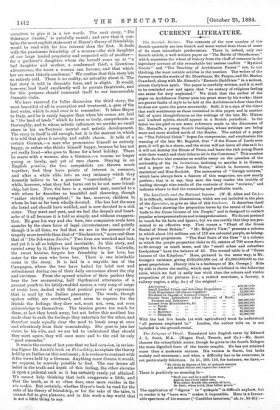The Eclogues of Virgil. Translated into English verse by Edward
J. L. Scott, M.A. (Kegan Paul, Trench, and Co.)ŌĆöMr. Scott chooses the octosyllabic metre, though he gives to the fourth Eclogue the more dignified form of the heroic couplet. He has not attained more than a moderate success. His version is fluent, bat lacks melody and sweetness ; and when a difficulty has to be overcome, is not particularly felicitous. In iii., 109, 110, for instance, we have,ŌĆö " Et vitula tu dignus.et hie, at quisquis amores Ant metuet dukes Itnt experictur amaros."
There is positively no meaning inŌĆö "Both you and he a calf bare won, And so has every other one,
Who either dreads the sweets of love, Or finds, when tried, they bitter prove."
The application of " dignus " to " quisquis " is difficult anyhow, but to render it by "have won" makes it impossible. Here is a favour- able specimen of his manner ("Candidus insuetum," ab. iv., 56-61) :ŌĆö " Daphnis, a white-robed stranger, eyes Olympus' threshold with surprise, And, distant far beneath his feet, The clouds and stars his vis,on meet. Therefore the woods and all beside That in the country parts abide. Both Pan, and Shepherd, and the maids Hight Dryads, frolic glee pervades ; No wolf against the dock hiswiles Premeditates, no net beguiles The stags by any tempting lure, Good Daphnis byes a life secure."



































 Previous page
Previous page